PST Scuba

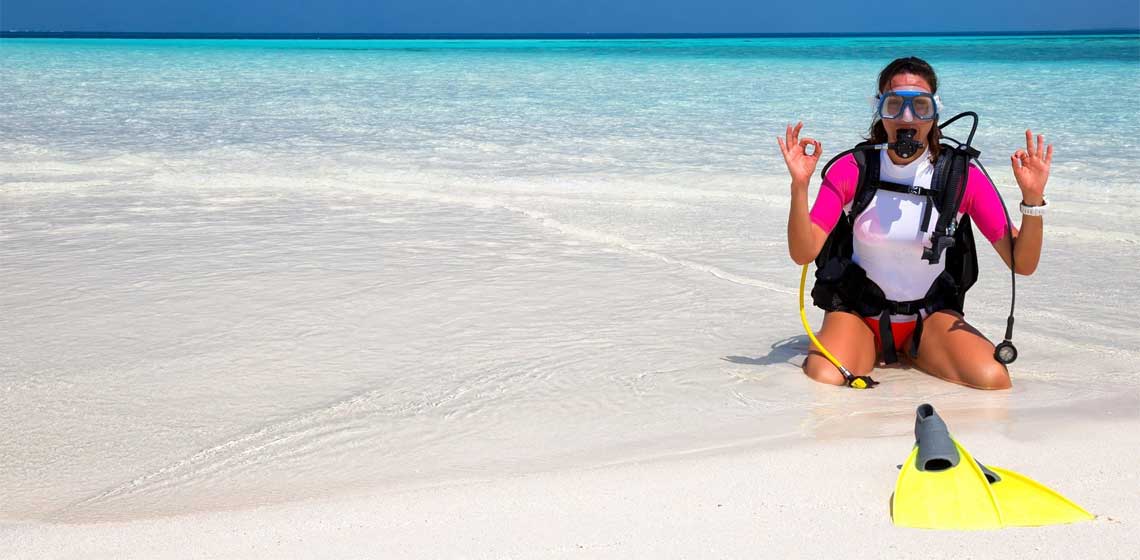
Scuba Diving Certification for Beginners
So, you’re about to take up scuba diving— lucky you! Scuba diving is an exhilarating new experience and one which will provide you with memories to cherish for a lifetime. But although it’s super simple to learn, there’s more to scuba diving than popping on a mask and jumping in. In fact, before you ever take your first dive, it’s important to get your diving certification. If this is news to you, you’re not alone— many people are unfamiliar with the certification process, and that’s why we’ve made a list of our top tips to help you get started.
Can You Dive Without Certification?
 The short answer is yes, but please don’t stop reading there! Because unlike the process of learning to drive— you pass a test, get your license, and you’re good to go— learning to scuba dive doesn’t work that way. Similarly, if you fail to get proper certification and obtain a diving license, you’re not in danger of legal action in the same way you would be if you drove without a license. But not getting arrested isn’t really the point. Rather, being certified to scuba dive is important because it can save your life.
The short answer is yes, but please don’t stop reading there! Because unlike the process of learning to drive— you pass a test, get your license, and you’re good to go— learning to scuba dive doesn’t work that way. Similarly, if you fail to get proper certification and obtain a diving license, you’re not in danger of legal action in the same way you would be if you drove without a license. But not getting arrested isn’t really the point. Rather, being certified to scuba dive is important because it can save your life.
That’s why, even if you start your first dive in the context of a vacation package, pretty much any dive center, dive boat, or other type of scuba diving operator has the mandatory requirement that you become certified before diving with them. And if you’re thinking it’s better to avoid the hassle and find someone who won’t insist on that, we would suggest that you exercise extreme caution, as the companies who are lax about these safety regulations are likely to risk your safety in other areas as well.
So, while it is possible to dive without certification, we strongly advise against it for your safety. We would also caution you never to dive alone.
Why is it so Important to Get Certified?
Although we’ve already mentioned that scuba diving can be dangerous, it’s important for new divers to get the facts about why. Although our goal is not to scare new divers, we do want you to be aware of the risks so that you can protect yourself accordingly and have a fun and safe dive. With that said, you should be aware that some of the biggest risks associated with diving include:
- Decompression sickness
- Arterial air embolism
- Drowning
Decompression sickness occurs because the ocean is not our natural environment; unlike fish, people aren’t designed to withstand the weight of so much water or to breathe naturally whilst underwater for long periods of time. Tanks of compressed air help us, of course, but they bring their own risks. Because when we breathe in compressed air while we’re also deep under water, our bodies can absorb more nitrogen than it’s safe for them to handle. So, when you return to your land, you may find that your body has absorbed too much nitrogen and thus resulting in nitrogen bubbles arising within your body’s tissue.
Arterial air embolisms are a direct result of decompression sickness because they occur when nitrogen bubbles form in an artery as you resurface. This can in turn block blood flow throughout your body. And although these complications can be extremely painful— and even result in death— the good news is that they are both rare and preventable through the practice of appropriate diving safety protocols. But unless you take a diving course from a certified diving instructor and learn those safety tips, you won’t know how to prevent any of these dangers.
How Much Does It Cost to Get Scuba Certified?
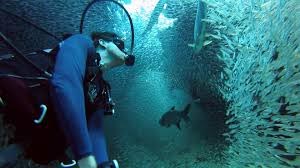 By now, we’re hoping that you agree with the importance of getting your scuba certification. And if you are, the first question on your mind is probably, “How much does it cost?” The simple answer is that it varies depending on your location and circumstance. If your dive occurs in the context of a vacation package, the fee for your certification and first test dive might be included, although some resorts do require that you get certified before diving with them. So, if you’re checking out a dive center near you, your costs can vary based on the facility and the type of training they provide. However, a quick survey of basic certification courses offered by diving centers all around the US indicates that you’ll be looking at an average cost of between $350-$450.
By now, we’re hoping that you agree with the importance of getting your scuba certification. And if you are, the first question on your mind is probably, “How much does it cost?” The simple answer is that it varies depending on your location and circumstance. If your dive occurs in the context of a vacation package, the fee for your certification and first test dive might be included, although some resorts do require that you get certified before diving with them. So, if you’re checking out a dive center near you, your costs can vary based on the facility and the type of training they provide. However, a quick survey of basic certification courses offered by diving centers all around the US indicates that you’ll be looking at an average cost of between $350-$450.
Purchasing your own diving equipment incurs additional costs, of course, but unless you plan on taking up diving as a hobby, you may be able to avoid this cost if you simply go on a quick vacation dive.
What do You Have to do to Get Certified?
Much like taking your driving test, the process of getting certified to dive involves a few different components: the academic part, which is typically taught in a classroom and involves learning a lot about diving basics, confined dive training, where you’ll practice your technical diving skills in a safe space like a pool first, and finally, open water training, when you’ll get to practice in the ocean for the first time. Although it might sound like a lot of work, in practice, it’s really not too bad!
Learning about best diving practices through an online course prepares you for knowing what to do when you get in the water, and practicing in a pool gives you a chance to get comfortable applying what you’ve learned before you’re (literally) thrown into the deep end. It also doesn’t take as long as you might expect, either! In fact, your entire diving certification can be completed over the course of two or three weekends, which means that you get to learn a fun new skill without sacrificing too much of your time. Win-win, right!
So, while there are lots of cool things to learn about scuba diving, the steps to getting your certification are some of the most important. We hope these tips help you get started, and if you have any questions that aren’t answered on this list, feel free to reach out to us! We’d love to help!
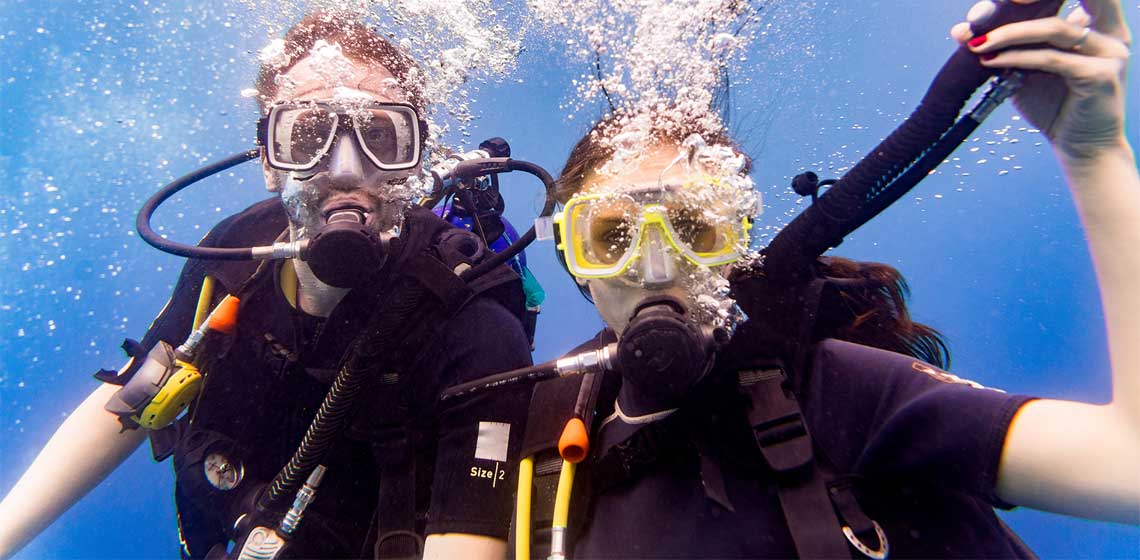
6 Top Tips for Your First Dive
If you’ve ever wanted to feel like a fish, diving is the sport for you! Whether you want to dive in (get it?) as part of a fun addition to your tropical vacation or you’d like to take up diving as a new hobby, your childhood dream of becoming a mermaid can finally come true. By the time you’re preparing for your first dive, you should have already completed your diving certification course and gotten comfortable with common safety regulations and diving best practices. So, why not get off to the best start by taking a look at ten of our top tips for your first-ever dive.
Be One with the Waves
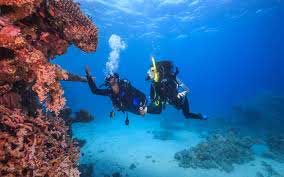 Weather can have a tremendous impact on diving conditions. If it’s a stormy day or the wind has caused the waves to become high and choppy, it might be difficult to reach a safe and stable point of immersion when you jump in. You should also be mindful of underwater currents which can pose significant danger to divers if they get caught up and unable to escape. So, if it looks like a rough day, play it safe— just come back another day and try again.
Weather can have a tremendous impact on diving conditions. If it’s a stormy day or the wind has caused the waves to become high and choppy, it might be difficult to reach a safe and stable point of immersion when you jump in. You should also be mindful of underwater currents which can pose significant danger to divers if they get caught up and unable to escape. So, if it looks like a rough day, play it safe— just come back another day and try again.
Listen to Your Heart
Okay, that was a very Little Mermaid thing to say. But corniness aside, it’s important to be attentive to your own instincts while diving. If you’re nervous about anything or have unanswered questions and concerns, once again, it’s better to err on the side of caution. Keep in mind that you won’t be able to communicate with your diving buddy while underwater and that things can get pretty tricky if you freeze up or have an anxiety attack. So, if you’re hesitant, either discuss your concerns with your dive instructor or simply wait until you feel more comfortable.
Breathe
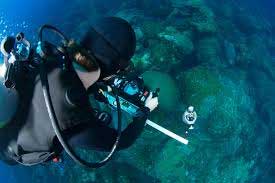 Even though you’ve passed your diving certification test by this point, breathing underwater might not feel totally natural to you yet. So, if you’re feeling a bit, well, not like a fish, you can calm these anxieties by reminding yourself that you literally have an air supply attached to you, so it’s okay to breathe normally. Although you might be tempted to freeze up or try to conserve your oxygen, remember that that isn’t necessary. In fact, failing to breathe normally will cause more complications, so do your best to think fish-y thoughts and breathe just like you would on land.
Even though you’ve passed your diving certification test by this point, breathing underwater might not feel totally natural to you yet. So, if you’re feeling a bit, well, not like a fish, you can calm these anxieties by reminding yourself that you literally have an air supply attached to you, so it’s okay to breathe normally. Although you might be tempted to freeze up or try to conserve your oxygen, remember that that isn’t necessary. In fact, failing to breathe normally will cause more complications, so do your best to think fish-y thoughts and breathe just like you would on land.
No Touching!
This is probably the hardest rule to master because, honestly, if you see a cool fish on your dive, who wouldn’t want to touch it?? However, it’s important to remember that, no matter how much we might want to be, we’re not Steve Irwin and contrary to what we see in ocean adventure vlogs, as a general rule, we’re not meant to physically interact with the marine life we encounter on our dives. Although marine biologists or divers who are experienced in guided ocean interaction tours can give you more information on safe methods for getting up close and personal with your fishy friends, a good rule of thumb is to look but don’t touch.
Take it Slow
If you’re getting the impression that caution is the main focus of our top tips, you’re catching on. We don’t mean to be a buzz kill; we’re just here to keep you safe. So, once again, we advise that you play it safe on your ascent and avoid shooting out of the water like a dolphin. Rising too quickly can lead to decompression sickness and possibly even burst your lungs, so make an attempt to rise more slowly than the bubbles that come out every time you breathe. Because the bubbles will rise quickly, staying a good few paces behind them will help you adjust your speed to a safe level.
Buddy Up
Although diving alone isn’t illegal, it’s very ill-advised and definitely shouldn’t be happening on your first dive. In fact, any ethical diving instructor will tell you that, no matter how experienced you are, diving on your own is never a safe or advisable idea. So, for starters, make sure you always have a diving buddy. And then once you have one, make sure you’re being a good buddy in return by keeping an eye out for your partner through the course of your dive. You may not be able to communicate much underwater, but you can still be there for each other if trouble arises. So, be the kind of diving buddy you’d want to have and keep an eye out for your partner’s health, diving level, and equipment status.
Always Double Check
This might be the last tip on our list, but it is by no means the least! Checking your equipment before you get in the water is critical for your safety and that of your partner, so never assume that everything is working properly without giving it a test first.
In short, while there are a few risks associated with diving, they don’t have to keep you from fully enjoying the experience. So, to play it safe and have fun, just follow these tips for a happy, healthy first div
Pressed Steal Tank Scuba Diving Equipment
Welcome to PST-Scuba’s web site – we appreciate your visit. Please bookmark this site, and revisit us often. New features will be added weekly, with important news and helpful product information.
Dive the Advantages of PST-Scuba Steel Cylinders
PST-Scuba’s steel tanks are designed to meet the ideal capacity, comfort and performance characteristics desired by novice, advanced and professional divers. Divers all over the world have come to recognize the unique quality and reliability found only in PST-Scuba cylinders.
PST-Scuba’s latest scuba tank line is the E-Series. This revolutionary new product design offers cutting-edge features and benefits, and has become one of the most sought after diving cylinders today.
Since 1902, Pressed Steel Tank Company, Inc. has been on the leading edge of cylinder design. As a division of Pressed Steel Tank, PST-Scuba continues to set the standards for product performance, quality, reliability and safety.
